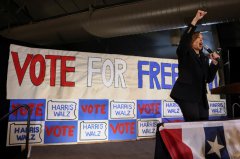Where is Hassan Nasrallah? After Israel's strikes on Beirut, Hezbollah — and the Middle East — stands at a crossroads
analysis
Hezbollah leader Hassan Nasrallah was reportedly the target of the IDF strikes.
As smoke rises over the Beirut skyline, one big question remains so far unanswered: where is Hezbollah's leader, Hassan Nasrallah?
The Israel Defense Forces (IDF) said it had bombed several residential buildings in Beirut's south, claiming the militant group's "central headquarters" were embedded underneath.
These were Israel's largest strikes on Beirut in nearly two decades.
Multiple media outlets in the Middle East claimed the target of the strike was Nasrallah, and the group has not said anything about the fate of its leader.
The extensive damage recalls scenes from the 2006 war between Israel and Hezbollah, which left an estimated 1,191 Lebanese people dead, as well as 43 Israeli civilians, and about 120 IDF soldiers.
It also recalls Israel's "Dahiya Doctrine", a longstanding military strategy of responding to attacks with disproportionate force and mass destruction.
How we got here
Hezbollah and Israel have been trading fire since the Israel-Gaza war erupted after the Hamas-led attacks of October 7 last year.
Hezbollah has denied that any weapons or arms depots were located in buildings
Tens of thousands of people on both sides of the border have fled their homes, leaving large areas mostly deserted.
Israel has been swiftly killing Hezbollah's leaders — lately, in bases built underneath residential areas, where the civilian death toll has been high.
With the intensive bombings, Hezbollah has suffered unprecedented losses of both its leadership and munitions.
That was after the pager and walkie-talkie attacks earlier this month killed dozens and maimed thousands of its members.
At least six people were killed and 76 were wounded, according to Lebanon's health ministry, but Nasrallah's condition remains unclear.
He has spent much of the time since 2006 in hiding, fearful of assassination.
He is reported to live in a reinforced bunker deep underground.
If he has been killed, it may not be confirmed for a little while.
What this could mean
Nasrallah has led Hezbollah since 1992, and is considered by Israeli and other regional intelligence agencies to be a shrewd and strategic thinker.
The group is listed as a terrorist organisation by the Australian government, but it is also deeply embedded in Lebanese government and society.
Hassan Nasrallah has reportedly been living largely underground to avoid assassination attempts.
He has, however, admitted to making major miscalculations, such as ordering the kidnapping of Israeli soldiers in 2006 that saw Israel respond with a ground invasion of Lebanon.
Nasrallah's decision to open a "support front" for Hamas in Gaza after the October 7 attacks is now looking like an even bigger mistake.
The group appears to have badly underestimated Israel's willingness, after months of relative stasis, to dramatically escalate.
A major factor they ignored was Israel winding down its activity in Gaza and concluding operations in the West Bank, giving the IDF time to prepare for a major commitment on the Lebanon border.
The group also failed to recognise the significance of Israel's cabinet decision to make returning the residents of the north an official goal of the war in Gaza.
Hezbollah also did not appear to anticipate how quickly Israel would act on this decision.
Israel wanted its strikes to force Hezbollah to back down and stop its attacks, but the group became more entrenched in the conflict, firing rockets and missiles deep into Israel.
The problem for Hezbollah now is that Israel is clearly willing to keep escalating.
Hezbollah's response to these strikes will depend on Nasrallah's condition and how much of the group's weapons and fighters remain.
In the long term, it's important to note that Israel assassinated the previous leaders of both Hamas — in 2004 — and Hezbollah — in 1992.
In each case, the groups recovered and grew in strength.
By:https://www.abc.net.au/news/2024-09-28/nasrallahs-fate-unclear-after-israel-strike-on-beirut/104408464(责任编辑:admin)
下一篇:Ukrainian President Volodymyr Zelenskyy meets Donald Trump for first time since Russia's invasion of Ukraine
 Socceroos rescue a point
Socceroos rescue a point  Wallabies thrash Wales 52
Wallabies thrash Wales 52 Jake Paul beats Mike Tyso
Jake Paul beats Mike Tyso Live updates: England vs
Live updates: England vs  US election 2024: Donald
US election 2024: Donald  US election live: Kamala
US election live: Kamala
- ·North Korea's latest weapon agains
- ·Hezbollah says Israel 'cannot impo
- ·Inside the rise of US oligarchs and how
- ·Thailand's worst suspected serial
- ·Tabi shoes are turning heads from Holly
- ·FBI arrests Florida man planning attack
- ·Illegal immigrant gets life sentence fo
- ·Bibles, water, watches and sneakers: Do
- ·North Korea's latest weapon against
- ·Hezbollah says Israel 'cannot impose
- ·Inside the rise of US oligarchs and how i
- ·Thailand's worst suspected serial ki
- ·Tabi shoes are turning heads from Hollywo
- ·FBI arrests Florida man planning attack o
- ·Illegal immigrant gets life sentence for
- ·Bibles, water, watches and sneakers: Dona
- ·US to give Kyiv anti-personnel landmines
- ·An arrest warrant for Benjamin Netanyahu
- ·One of Vietnam's high-profile politi
- ·Shanghai Walmart Attack: A Man Randomly S
- ·South Korean police officers jailed over
- ·Cambodia publicly shames maid deported af
- ·North Korea to use all forces including n
- ·Philippines condemns China attack of Viet
- ·US adds 2 more Chinese companies to Uyghu
- ·North Korean defector steals South Korean
- ·Malaysia deports Cambodian worker for cal
- ·Rebels battle for Myanmar junta’s weste

